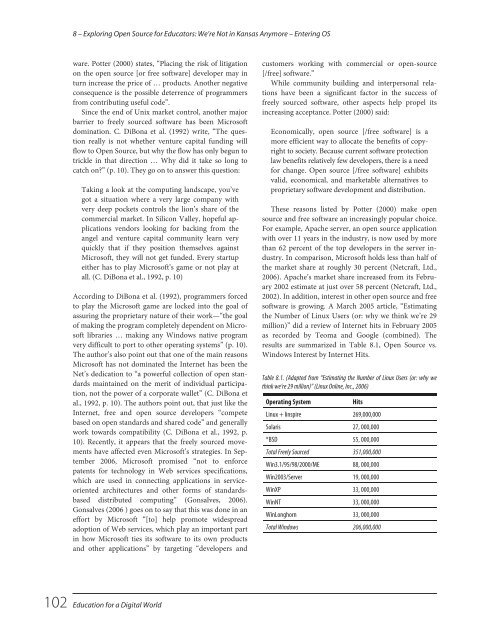Education for a Digital World Advice, Guidelines and Effective Practice from Around Globe, 2008a
Education for a Digital World Advice, Guidelines and Effective Practice from Around Globe, 2008a
Education for a Digital World Advice, Guidelines and Effective Practice from Around Globe, 2008a
You also want an ePaper? Increase the reach of your titles
YUMPU automatically turns print PDFs into web optimized ePapers that Google loves.
8 – Exploring Open Source <strong>for</strong> Educators: We’re Not in Kansas Anymore – Entering OS<br />
ware. Potter (2000) states, “Placing the risk of litigation<br />
on the open source [or free software] developer may in<br />
turn increase the price of … products. Another negative<br />
consequence is the possible deterrence of programmers<br />
<strong>from</strong> contributing useful code”.<br />
Since the end of Unix market control, another major<br />
barrier to freely sourced software has been Microsoft<br />
domination. C. DiBona et al. (1992) write, “The question<br />
really is not whether venture capital funding will<br />
flow to Open Source, but why the flow has only begun to<br />
trickle in that direction … Why did it take so long to<br />
catch on?” (p. 10). They go on to answer this question:<br />
Taking a look at the computing l<strong>and</strong>scape, you’ve<br />
got a situation where a very large company with<br />
very deep pockets controls the lion’s share of the<br />
commercial market. In Silicon Valley, hopeful applications<br />
vendors looking <strong>for</strong> backing <strong>from</strong> the<br />
angel <strong>and</strong> venture capital community learn very<br />
quickly that if they position themselves against<br />
Microsoft, they will not get funded. Every startup<br />
either has to play Microsoft’s game or not play at<br />
all. (C. DiBona et al., 1992, p. 10)<br />
According to DiBona et al. (1992), programmers <strong>for</strong>ced<br />
to play the Microsoft game are locked into the goal of<br />
assuring the proprietary nature of their work—“the goal<br />
of making the program completely dependent on Microsoft<br />
libraries … making any Windows native program<br />
very difficult to port to other operating systems” (p. 10).<br />
The author’s also point out that one of the main reasons<br />
Microsoft has not dominated the Internet has been the<br />
Net’s dedication to “a powerful collection of open st<strong>and</strong>ards<br />
maintained on the merit of individual participation,<br />
not the power of a corporate wallet” (C. DiBona et<br />
al., 1992, p. 10). The authors point out, that just like the<br />
Internet, free <strong>and</strong> open source developers “compete<br />
based on open st<strong>and</strong>ards <strong>and</strong> shared code” <strong>and</strong> generally<br />
work towards compatibility (C. DiBona et al., 1992, p.<br />
10). Recently, it appears that the freely sourced movements<br />
have affected even Microsoft’s strategies. In September<br />
2006, Microsoft promised “not to en<strong>for</strong>ce<br />
patents <strong>for</strong> technology in Web services specifications,<br />
which are used in connecting applications in serviceoriented<br />
architectures <strong>and</strong> other <strong>for</strong>ms of st<strong>and</strong>ardsbased<br />
distributed computing” (Gonsalves, 2006).<br />
Gonsalves (2006 ) goes on to say that this was done in an<br />
ef<strong>for</strong>t by Microsoft “[to] help promote widespread<br />
adoption of Web services, which play an important part<br />
in how Microsoft ties its software to its own products<br />
<strong>and</strong> other applications” by targeting “developers <strong>and</strong><br />
customers working with commercial or open-source<br />
[/free] software.”<br />
While community building <strong>and</strong> interpersonal relations<br />
have been a significant factor in the success of<br />
freely sourced software, other aspects help propel its<br />
increasing acceptance. Potter (2000) said:<br />
Economically, open source [/free software] is a<br />
more efficient way to allocate the benefits of copyright<br />
to society. Because current software protection<br />
law benefits relatively few developers, there is a need<br />
<strong>for</strong> change. Open source [/free software] exhibits<br />
valid, economical, <strong>and</strong> marketable alternatives to<br />
proprietary software development <strong>and</strong> distribution.<br />
These reasons listed by Potter (2000) make open<br />
source <strong>and</strong> free software an increasingly popular choice.<br />
For example, Apache server, an open source application<br />
with over 11 years in the industry, is now used by more<br />
than 62 percent of the top developers in the server industry.<br />
In comparison, Microsoft holds less than half of<br />
the market share at roughly 30 percent (Netcraft, Ltd.,<br />
2006). Apache’s market share increased <strong>from</strong> its February<br />
2002 estimate at just over 58 percent (Netcraft, Ltd.,<br />
2002). In addition, interest in other open source <strong>and</strong> free<br />
software is growing. A March 2005 article, “Estimating<br />
the Number of Linux Users (or: why we think we’re 29<br />
million)” did a review of Internet hits in February 2005<br />
as recorded by Teoma <strong>and</strong> Google (combined). The<br />
results are summarized in Table 8.1, Open Source vs.<br />
Windows Interest by Internet Hits.<br />
Table 8.1. (Adapted <strong>from</strong> “Estimating the Number of Linux Users (or: why we<br />
think we’re 29 million)” (Linux Online, Inc., 2006)<br />
Operating System<br />
Hits<br />
Linux + linspire 269,000,000<br />
Solaris 27, 000,000<br />
*BSD 55, 000,000<br />
Total Freely Sourced 351,000,000<br />
Win3.1/95/98/2000/ME 88, 000,000<br />
Win2003/Server 19, 000,000<br />
WinXP 33, 000,000<br />
WinNT 33, 000,000<br />
WinLonghorn 33, 000,000<br />
Total Windows 206,000,000<br />
102 <strong>Education</strong> <strong>for</strong> a <strong>Digital</strong> <strong>World</strong>


















